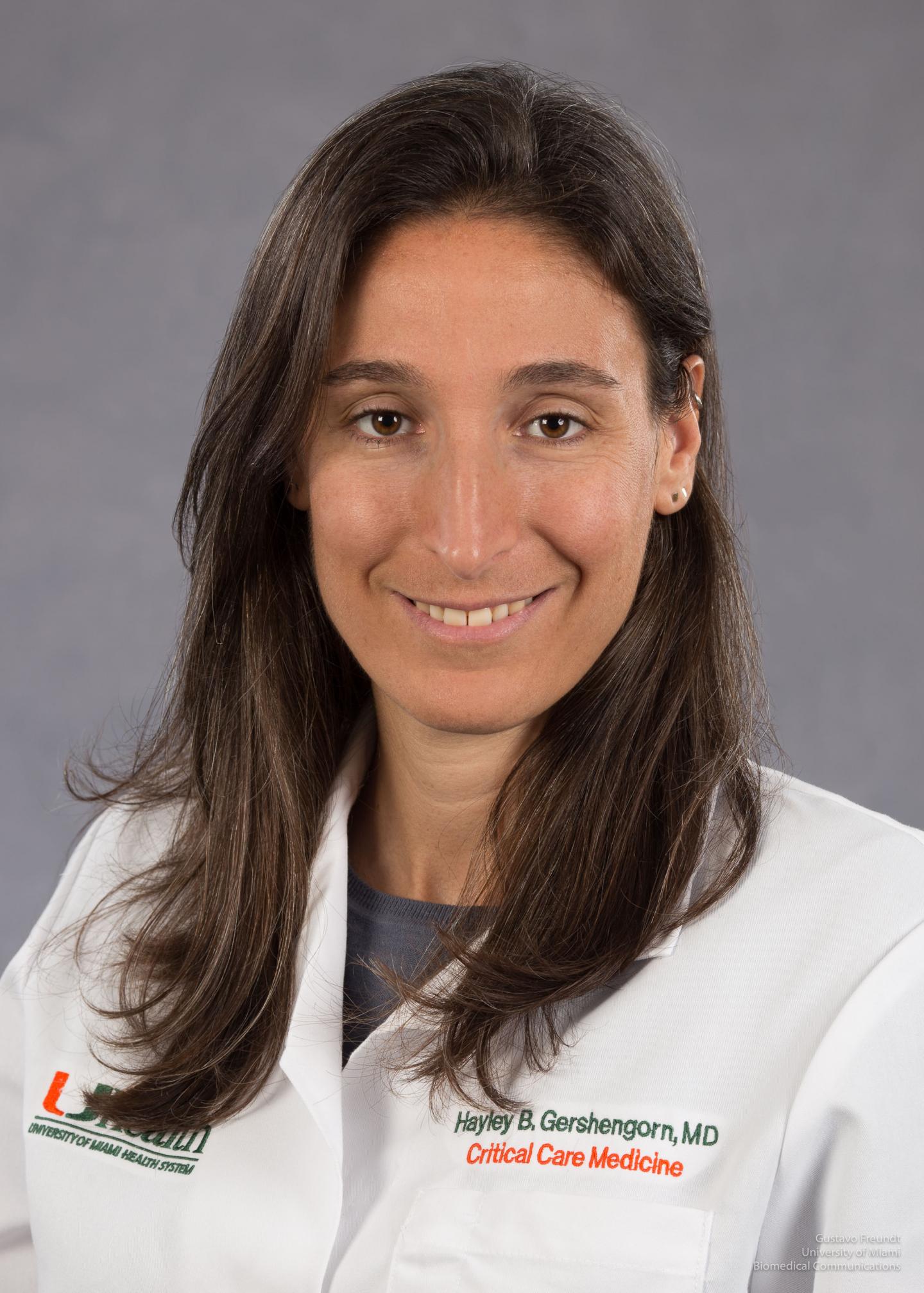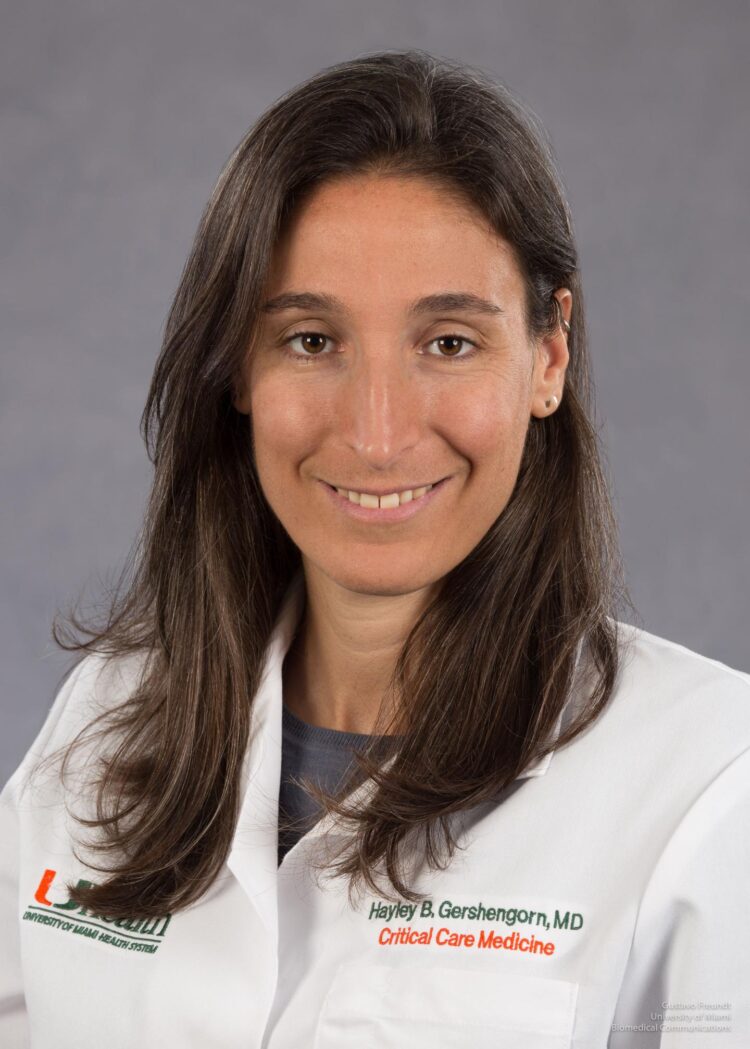
Credit: University of Miami Health System
During a public health crisis like the COVID-19 pandemic, U.S. hospitals need to allocate scarce medical resources in an equitable manner, according to clinicians and ethicists at the University of Miami Miller School of Medicine.
“Significant concerns have been raised that crisis standards of care may be biased against certain patients based on race or ethnicity,” said Hayley Gershengorn, M.D., associate professor of pulmonary and critical care medicine. “To examine that issue, we analyzed over a thousand medical records from two academic hospitals where University of Miami faculty see patients and found no disparities in how our crisis standards of care policy prioritizes patients.”
Dr. Gershengorn was the lead author of the study, “Assessment of the Disparities Associated With a Crisis Standards of Care Resource Allocation Algorithm for Patients in Two U.S. Hospitals During the COVID-19 Pandemic,” published March 11 in JAMA Network Open, a journal of the American Medical Association.
“Early in the pandemic, we became concerned that demand for hospital resources such as ventilators would be greater than availability,” she said. “A crisis policy can help physicians allocate resources in such circumstances.”
To address those ethical issues, a Miller School team developed a Crisis Standards of Care policy that was approved by the university and now serves as a model for other members of the Florida Hospital Association, said Dr. Gershengorn. “After approving the policy, we felt it was also important to see how well the policy could be put into practice,” she added.
The critical care faculty recruited third-year Miller School students to go through the medical records daily and calculate priorities based on the sequential organ failure assessment (SOFA) score, which measures patient acuity, and comorbidity burden. “This study would not have been possible without our students,” said Dr. Gershengorn. “They did an amazing job.”
The new study asked the question: Is there an association of race or ethnicity with priority scores used for resource allocation under our institution’s crisis standards of care policy? The researchers looked at 1,127 adult patients (with 5,613 patient-days of data) who were admitted to one of the COVID-19 wards or were in a monitored unit requiring invasive or noninvasive ventilation or high-flow nasal cannula between May 26 and July 14, 2020.
“We found the priority score did not appear to discriminate against hospitalized patients based on self-identified Black race or Hispanic ethnicity,” said Dr. Gershengorn.
Co-author Kenneth W. Goodman, Ph.D., director of the University of Miami Institute for Bioethics and Health Policy, said, “In a time of too much bad news, these results are very good news. We found that our resource allocation protocol would – if activated – not worsen existing inequities for Black and Hispanic populations when it comes to COVID-19.”
Another co-author, Jeffrey P. Brosco, M.D., Ph.D., professor of pediatrics and the Institute’s director of population health ethics, added, “We need to redouble our efforts to improve health equity, and one way is for health care providers to use data as we did to examine the effects of our policies and procedures.”
Other Miller School co-authors included Gregory E. Holt, M.D., Ph.D., assistant professor of medicine; Joseph West, Sc.M., Sc.D. , voluntary assistant professor of public health science; Daniel H. Kett, M.D., professor of clinical medicine and associate chief medical officer for critical care at the University of Miami Hospital, as well as Miller School students Andrew Rezk, Stefanie Delgado, Nayna Shah, Arshia Arora, Leah B. Colucci, MS, Belen Mora, Rahul S. Iyengar, MHA, Andy Lopez, and Bianca M. Martinez.
Rezk, M.D. Candidate, Class of 2021, organized the data collection at the two academic hospitals with other students. “What I learned in this study is the importance of not just being aware of unintended health disparities but actively acknowledging them because these are life or death decisions that can affect an entire race or ethnicity,” he said.
Another member of the Class of 2021, Delgado contributed to generating a protocol for the study, as well as training and supervising medical student volunteers. “The importance of acknowledging and addressing health disparities is imperative if we are to practice effective and equitable healthcare to all,” she said. “The more we are aware of possible and existing disparities, the better prepared we are to identify and address associated obstacles which will ultimately lead to a better patient physician interaction and hopefully better health outcomes as well.”
###
Media Contact
Joanna Palmer
[email protected]
Original Source
http://jamanetwork.





